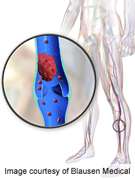Von Willebrand factor linked to bleeding complications

(HealthDay) -- Oral anticoagulation (OAC)-treated patients with high levels of von Willebrand factor (VWF) have elevated risks of bleeding complications and cardiovascular and all-cause mortality, according to a study published in the March issue of the Journal of Internal Medicine.
Marcus Lind, M.D., of Umeå University Hospital in Sweden, and associates conducted a longitudinal study of 719 patients receiving OAC treatment to evaluate the link between VWF plasma levels and risk of bleeding complications, cardiovascular death, and all-cause mortality.
During 4.2 years of follow-up, the researchers identified 113 cases of clinically relevant bleeding and 73 cases of major bleeding; and there were 161 deaths, including 110 attributed to cardiovascular disease. There was a significantly increased risk of bleeding complications for patients in the highest tertile of VWF (hazard ratio [HR] for major bleeding, 2.53; HR for clinically relevant bleeding, 2.19). VWF was significantly associated with cardiovascular and all-cause mortality (HR, 1.68 and 1.77, respectively). These findings were significant after adjusting for age, high-sensitivity C-reactive protein, and creatinine.
"Our findings imply that the use of VWF as a risk marker for thromboembolic events is complicated by the association of VWF with bleeding complications," the authors write.
More information:
Abstract
Full Text (subscription or payment may be required)
Copyright © 2012 HealthDay. All rights reserved.
















